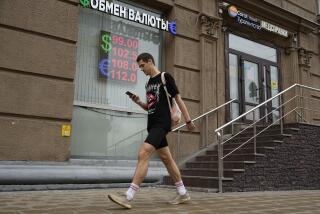Ruble’s Fall Fuels a Run on Banks : Russia: Citizens scramble for dollars as doubt over reforms collapses currency.
- Share via
MOSCOW — In the biggest blow to the ruble since it stabilized last year, Russians in search of dollars mobbed banks and exchange houses for a third straight day Wednesday, bringing urgency to a crisis over leadership of the country’s economic reforms.
The ruble, relatively steady since July, plunged to a low of 1,607 to the dollar on the Moscow Inter-Bank Currency Exchange. It had closed at 1,354 per dollar last Friday but dropped to 1,402 Monday after the government’s leading reformer, Economics Minister Yegor T. Gaidar, resigned.
Since then, it has slid another 100 points per day as President Boris N. Yeltsin and his prime minister struggle to form a new Cabinet and as Muscovites scramble through snowstorms to dump the ruble, fearing the demise of anti-inflation policies that had sustained its value.
“I’m afraid my savings will evaporate tomorrow,” said Ludmila S. Pashkova, 67, a retired schoolteacher who has never owned a dollar bill, as she lined up at Moscow’s Inkombank. Shivering in a worn cloth coat and no gloves, she waited more than an hour to buy $50.
“We’re feeling panic here, an enormous influx of people--businessmen, babushkas , students, everybody,” said an exchange house cashier on Neglinka Street after selling all $40,000 on hand and closing early.
The ruble’s stability has been an important cornerstone of Russia’s agreements with the International Monetary Fund and other leading creditors, and its collapse could threaten the delivery of billions of dollars in promised assistance.
Seeking to restore calm, Prime Minister Viktor S. Chernomyrdin announced a partial restructuring of the Cabinet on Wednesday night, without settling the most important dispute: Who will control Russia’s finances?
Economists said they expected the ruble to keep falling until that question is resolved and the rest of the Cabinet named--a process that Yeltsin’s office said could take several more days.
The Interfax news service reported that Russia’s Central Bank had abandoned its efforts to prop up the ruble after pumping more than $1 billion into the banking system--nearly one-fourth of its hard currency reserves.
Two years after the collapse of communism, Russia developed a true currency market only last summer, when Finance Minister Boris G. Fyodorov achieved a stable exchange rate of 1,000 to 1,200 rubles to one dollar, in part by limiting subsidies to money-losing enterprises.
The credit squeeze has thrown many people out of work and delayed paychecks for others, adding to the hardships and uncertainties of Russia’s transition to a free market.
A backlash came last month when voters gave surprisingly strong support to Communists, nationalists and other advocates of a return to a planned economy.
Gaidar, a 37-year-old economist and the leading symbol of reform, resigned Sunday after failing to win Yeltsin’s backing to continue his radical assault on subsidies.
And the political crisis deepened as Fyodorov, Gaidar’s even younger ally, fought to keep his influence. He refused to stay in the Cabinet unless two of his foes--Central Bank President Viktor V. Gerashchenko and Alexander K. Zaveryukha, who oversees agriculture policy--were subordinated to him or fired.
Yeltsin and Chernomyrdin met for more than six hours Tuesday and failed to resolve the crisis, adding to a sense of political paralysis.
It was anticipation of Fyodorov’s ouster and a subsequent burst of inflation that sent Russians fleeing from the ruble this week.
“I don’t believe the old apparatchiks like Chernomyrdin can fix the situation,” said Sergei Tishkin, a 23-year-old businessman who used up a tank of gasoline Wednesday shopping for the best exchange rate. “He’s part of the old guard that ruled this country for 70 years and led it to catastrophe. Now they’re telling us they know how to achieve ‘stabilization.’ Ha! We’re no idiots.”
Anders Aslund, a Swedish economist who advises the government, said the ruble’s collapse has put Fyodorov in a strong position to keep bargaining for control of financial policy.
“For the first time, the market is playing a role in a Russian political crisis,” Aslund said. “Chernomyrdin simply cannot accept a devaluation like this every day. He has to find a credible finance minister, or he looks quite weak. Right now, there’s nobody but Fyodorov.”
In an interview with Interfax late Wednesday, Fyodorov said the devaluation was a direct result of politics and could be reversed.
The embattled minister added that he was willing to bet 100,000 rubles that if he were to resign, the ruble would crash to 2,000 per dollar within a week--a wager worth $62 now but $50 or less if he wins.
Andrei Ostroukh of The Times’ Moscow Bureau contributed to this report.
More to Read
Sign up for Essential California
The most important California stories and recommendations in your inbox every morning.
You may occasionally receive promotional content from the Los Angeles Times.













